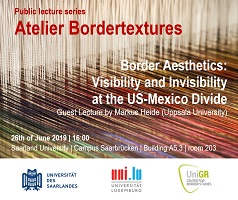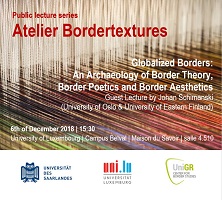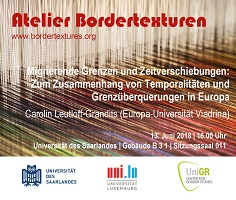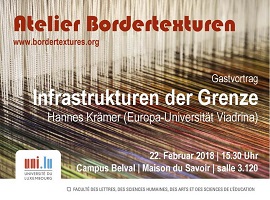Atelier Bordertextures
Atelier Bordertextures aims to unite theoretical and methodological lectures by researchers undertaking conceptual examinations of borders and border regions and their cultural representations. These lectures offer insights into and disclose bordertexture-related issues and illustrate disciplinary relationships and interdisciplinary connections. Atelier Border Textures provides a space for explorative investigation of potential approaches for cultural border studies with the aim of ensuring a better grasping and understanding of (re)production processes and various ways of (re)presenting borders and border regions.
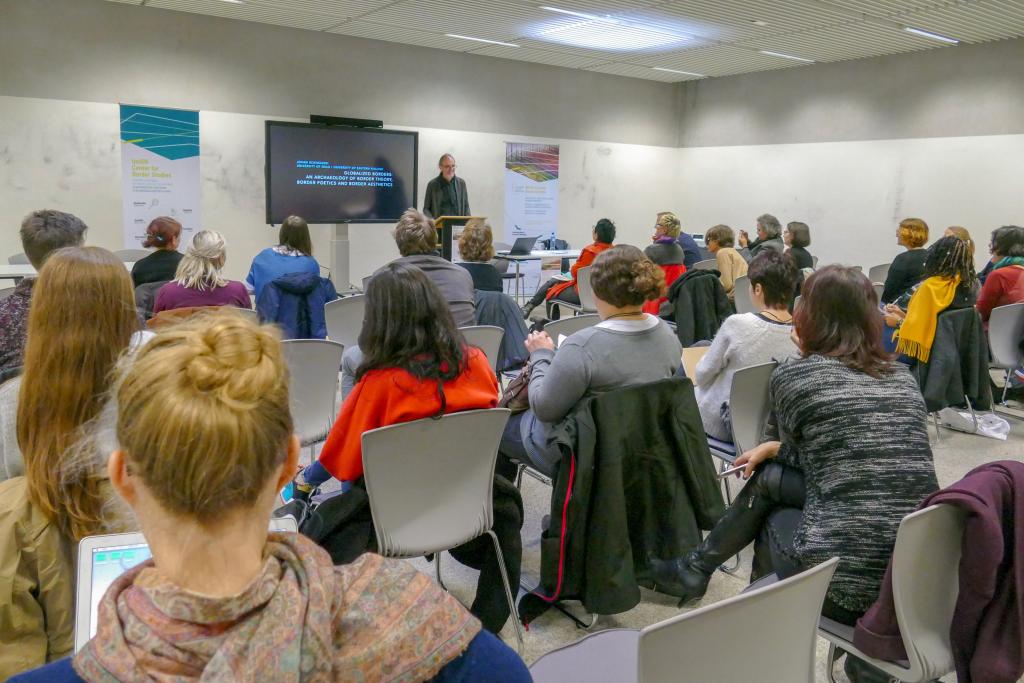
Program Atelier Bordertextures
- If you want to attend online...
-
... here is the link to our MS Teams meeting:
https://teams.microsoft.com/l/meetup-join/19%3ameeting_NDZjODgwZDYtYWQ1OS00NWI1LTljNWEtMWQ3NzM1ZDZlNTMy%40thread.v2/0?context=%7b%22Tid%22%3a%2267610027-1ac3-49b6-8641-ccd83ce1b01f%22%2c%22Oid%22%3a%227f0372b5-4c58-45d6-9ec3-6e08a5972b6e%22%7d
Join the meeting now
Meeting ID: 355 319 832 708 4
Passcode: EB3Pk6Px
8 December 2025
Poetik der Relationalität. Olivia Wenzels 1000 Serpentinen Angst als Bordertextur
Cécile Chamayou-Kuhn (University of Lorraine)
Lena Wetenkamp (KU Leuven)
8 December 2025, 5:00 p.m. (CET)
online via Microsoft Teams

The lecture demonstrates the analytical potential of the concept of bordertexture for examining complex narrative structures, using Olivia Wenzel’s novel “1000 Serpentinen Angst” (2020) as an example. The focus lies on the interconnection of uncertainty, relationality, and affectivity as aesthetic strategies within a framework of relational aesthetics. The analysis explores intradiegetic border experiences, co-presence, and interactional dynamics through which processes of bordering, disorientation, and affective instability become manifest. It is argued that these strategies generate a poetics of relationality that constitutes the text as a bordertexture.
Lena Wetenkamp has been Professor of Modern German Literature at KU Leuven (Belgium) since September 2025. Previously, she was Junior Professor at the University of Trier. She studied German Studies, Journalism, and Cultural Anthropology in Mainz and Lisbon. In 2017, she earned her PhD at Johannes Gutenberg University Mainz with the dissertation “Europa erzählt, verortet, erinnert. Europa-Diskurse in der deutschsprachigen Gegenwartsliteratur”. She has been a visiting lecturer in Bydgoszcz (Poland), Sassari (Italy), Milan (Italy), and Metz (France).
Cécile Chamayou-Kuhn is Maîtresse de conférences in German Studies at the University of Lorraine. She studied Comparative Literature, German, and Romance Studies at the University of Tübingen and earned her PhD in German Studies at the Sorbonne Nouvelle University. She is a member of the advisory board of the cross-border doctoral school LOGOS and of the CIERA steering committee. Her research focuses on contemporary literature and theatre, gender studies, border studies, interculturality, crises, and transitions.
- 2025
-
09 July 2025
Haïti (2010-2025) : penser une sortie de crise sécuritaire par la bordertexture
Jean Hérald Legagneur (State University of Haïti; KHK CURE Fellow, Saarland University)
09 July 2025, 6 pm CEST
Hybrid via MS Teams and at Saarland University, building A2 2, lecture hall 1.20.1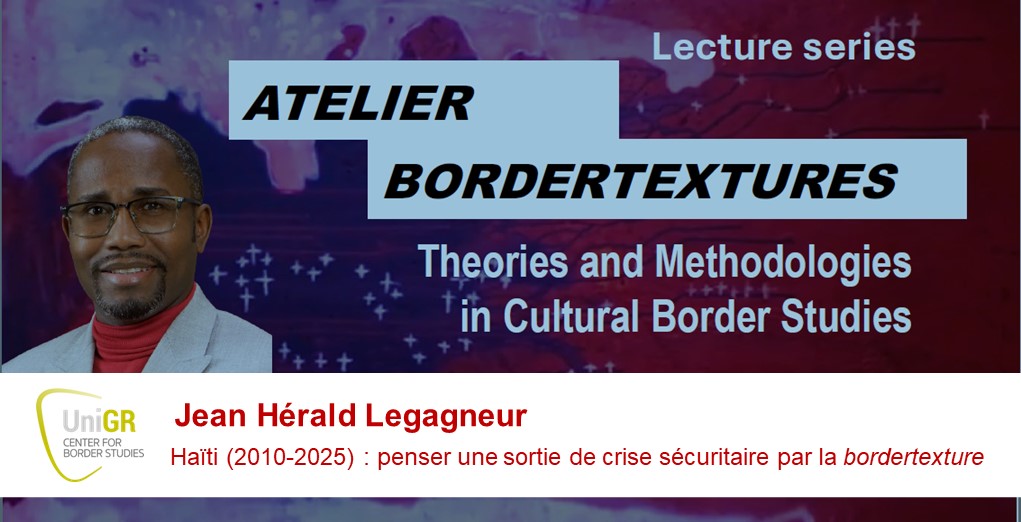
Comment penser Haïti autrement qu’à travers les catégories marginalisantes d’« État failli » ou d’« État voyou » ? Que révèle l’intensité des tensions géo-sociopolitiques qui s’y cristallisent, au cœur du bassin caraïbéen – carrefour géostratégique des Amériques ? Depuis la période coloniale, la partie occidentale de l’Île constitue un véritable laboratoire géopolitique. La frontière y joue simultanément le rôle de scène de pouvoir, d’espace de résistance et de projection. La période allant de 2010 à 2025 illustre pleinement cette dynamique. En effet, le séisme du 12 janvier 2010 a ouvert une double crise humanitaire et politique. La gestion opaque des fonds de la CIRH, l’introduction du choléra par la MINUSTAH (Piarroux, 2019) et l’éviction de Jude Célestin en 2011 au profit de Michel Martelly, soutenu par des puissances étrangères (Peck, 2012), témoignent d’une désarticulation des frontières de l’État haïtien. Ces frontières, qu’elles soient symboliques ou réelles, sont fragilisées par des acteurs qui, tout en affirmant vouloir stabiliser le pays, poursuivent souvent des intérêts divergents. Cela révèle la complexité, mais aussi les contradictions profondes des dynamiques à l’œuvre. Dans un tel contexte, marqué par une forme d’ingérence cynique et performative, un déplacement conceptuel semble nécessaire. La notion de bordertexture (AG Bordertextures, 2021), nourrie des apports théoriques de la nécropolitique d’Achille Mbembe (2016) et des frontières mobiles d’Étienne Balibar (2001), permet de penser la frontière non pas comme une ligne fixe, mais comme une texture relationnelle. Une texture à redéfinir dans tous les champs – notamment par les lettres et les arts, comme le montreront les œuvres mobilisées dans cette présentation. Trois événements récents rendent ce changement de regard d’autant plus nécessaire : en 2019, l’arrestation de mercenaires américains et la saisie d’armes de guerre à l’aéroport de Port-au-Prince ; en 2021, l’assassinat du président Jovenel Moïse par un commando colombien ; et depuis 2018, la reterritorialisation progressive du pays par des gangs lourdement armés, en grande partie approvisionnés depuis les États-Unis. Plus récemment encore, le classement de ces groupes comme « organisations terroristes internationales » par Marco Rubio s’apparente à une tentative de gestion sécuritaire de l’insécurité – qui vise, en réalité, à en tirer profit ou à la rentabiliser. Ne sommes-nous pas face à une nouvelle phase d’ingérence impériale ou néocoloniale, plus diffuse mais toujours active ? Et, dès lors, penser une sortie de crise par la bordertexture n’est-ce pas rouvrir l’horizon d’une refondation post-ingérence, fondée sur la justice mémorielle, la réparation institutionnelle et la reconquête de la souveraineté ?
Jean Hérald Legagneur, KHK CURE Fellow 2023/24
Professor at the State University of Haiti since 2008, Jean Hérald Legagneur teaches art history and mythology. He specializes in Haitian and Caribbean Francophone literature and visual arts, with a focus on cultural heritage preservation, identity issues, and cultural studies. He holds a PhD in literature from the University of Virginia and a master’s in philosophy and contemporary cultural criticism from the University Paris 8, in addition to having studied modern literature at the State University of Haiti. From 2017 to 2021, he served as an assistant professor of French and African American studies at the University of Virginia. In 2021, he managed the transfer of collections from the Musée d’Art Haïtien to the Centre d’art in Port-au-Prince. In 2023, he was appointed to the jury at the Haitian Centre d’art for its visual arts creation support program. His fellowship at CURE involves developing a theory of cultural reparation by analyzing artworks from the 277th Centre d’art Exhibition, demonstrating how these pieces reflect the gang violence in Haiti..
- 2024
-
03 May 2024
Affective Textures: Love as Border-Crossing in Cypriot Poetry and Film
Angelos Evangelou (National and Kapodistrian University of Athens)
03 May 2024, 5 pm CEST
Hybrid via Zoom and at Saarland University, Building B3 1, Lecture Hall 1 (HS 1)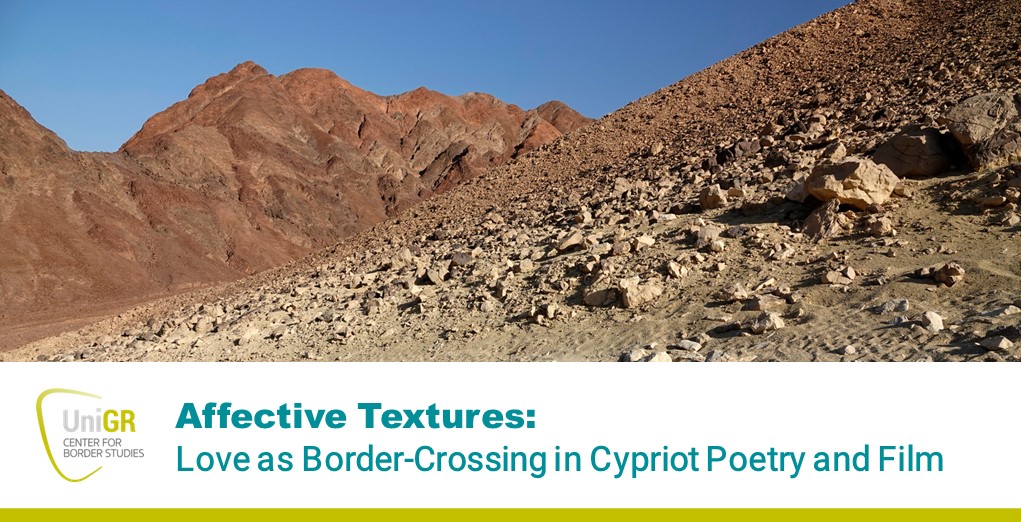
This presentation proposes an examination of the role of affective entanglement in the experience of borders and most importantly in the moments, the practices and the possibility of debordering. Specifically, I will focus on the theme of erotic love and defend it against the stereotypical views which dismiss it as a banal cliché, which has so far resulted in little critical work. In response, I explore the critical potential of erotic love for mobilising political change in the context of Cyprus as a divided island; a bordered space. Departing from the act of real and imaginary border-crossing, I trace the politicization of the body as it renders itself the textured space in which imposed ethnic, religious, ideological, gender and sexual borders are both suffered and resisted. In other words, in speaking, feeling, desiring and resisting from the border, the body also speaks about the border. Drawing from Foucault, Butler and Anzaldúa, as well as actively engaging with the concept of bordertextures, I look at the ways Neşe Yaşın’s poem “Unsent Letters” (1992) and Marios Psaras’s short film Thin Green Line (2017) establish a complex nexus between vulnerability and resistance mobilized by the body’s erotic energies. Their employment of erotic love as an agent for anti-border and reconciliatory politics complements Anzaldúa’s theorization of the borderland as a space of liminality which yields both vulnerability and possibility, a space where differences are not neutralized but unfold in creative and hybrid syntheses.
Angelos Evangelou is Assistant Professor in English Literature and Theory at the Department of English Language and Literature of the National and Kapodistrian University of Athens. Having worked extensively on the representation of the border between madness and reason in 20th and 21st century English Literature and Critical Theory, his current research focuses on the theorization of the border and the crosscurrents between Border Theory, Border Studies and Postcolonial Literature. Special emphasis lies on the representation of the physicality of the border as well as on bordering and debordering practices in British Literature, especially post-Brexit, as well as in the Anglophone Literatures and Cinemas of Cyprus, Palestine and Israel.
.
- 2023
-
16 November 2023
Thinking Bordertextures From and With Welcome Cultures
Lola Aubry (University of Luxembourg)
16 November 2023, 4 pm CET
Hybrid via WebEx and at the University of Luxembourg, MSH, Black Box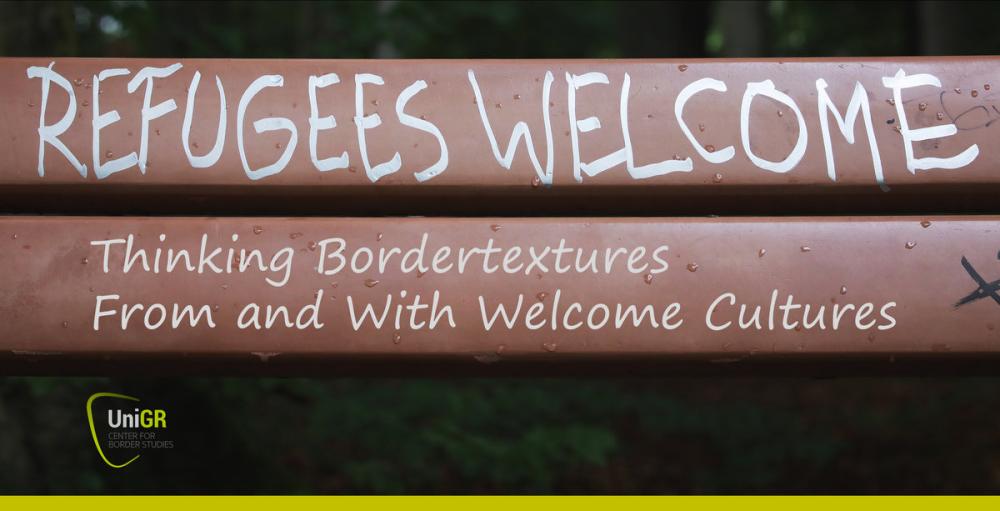
Thinking borders as textures invites to be attentive to the existence of a multiplicity of border realities and to the entangled and dynamic web of elements that constitute them. The lecture uses this approach and will look into the situated dynamics of bordertextures from the perspective of welcome cultures, which designate the array of grassroots solidarity initiatives that emerged in Europe following the long summer of migration (2015). Building on elements from a one-year ethnographic work in the Parisian welcome culture Lola Aubry will discuss such cultures as a positionality from which one can learn about processes of complication, multiplication, and texturization of border realities and how these dynamics matter in everyday welcome practices.
- 2022
-
30 November 2022
Soziale Grenz(ziehungs)praktiken und lokale Alltagsperspektiven auf Grenzen: Bordertexturen auf Lesbos
[Social border(ing) practices and local everyday perspectives on borders: Bordertextures on Lesbos]
Anett Schmitz (Universität Trier)
30 November 2022, 4 pm CET
online via zoom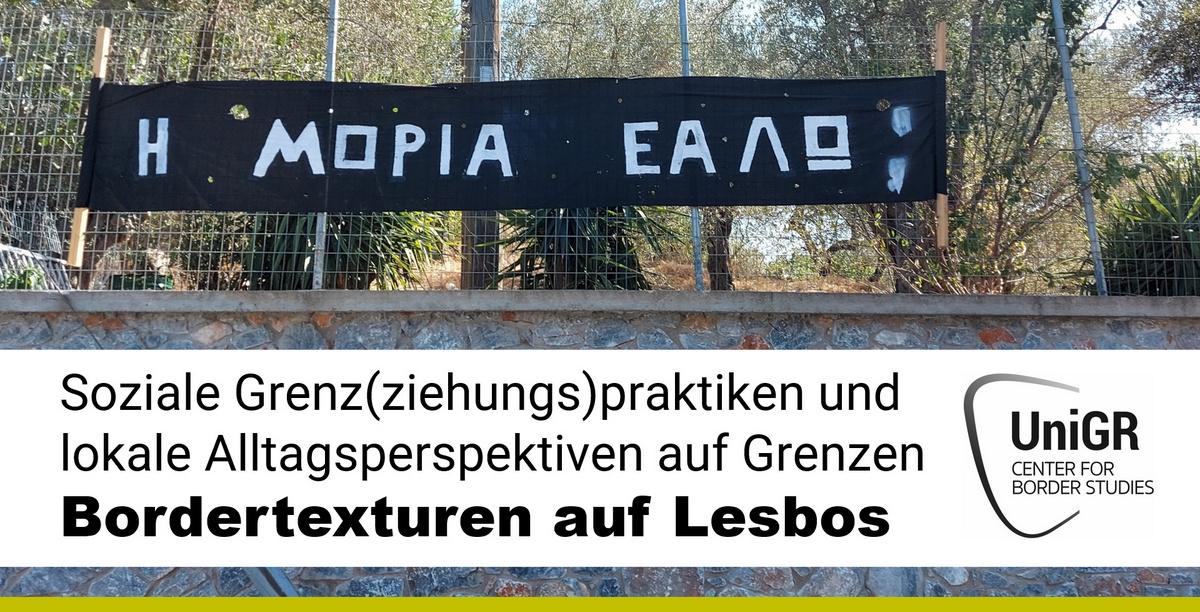
More and more fences and walls are being built at the EU's external borders to control migration and border crossings. An emblem of such border practices is the Greek island of Lesbos, which has become a humanitarian operation area since the establishment of the Moria hotspot for refugees. Since then, not only the local infrastructure of the island has been changing, but also the border narratives and dynamics of social borderings between migrants and islanders. The focus of the lecture is on such bordertextures on Lesbos, which can be elaborated through the local everyday structures and everyday cultural “border realities” of migrants and islanders. From this perspective, the lecture will present consequences, challenges, but also opportunities and possibilities for local structures and border realities.
The lecture is part of the international lecture series of the UniGR-CBS “Border Realities. Transformation of the border and new conceptual challenges”.
The lecture will be held in German.
- 2021
-
01 December 2021
Layer by Layer: Der weibliche Körper als Bordertextur
[Layer by Layer: The Female Body as a Bordertexture]
Rhea Maria Dehn Tutosaus (Technische Universität Darmstadt)
01 December 2021, 17:00-19:00 CET
online via zoomRegister here: https://bit.ly/3oNH4HE
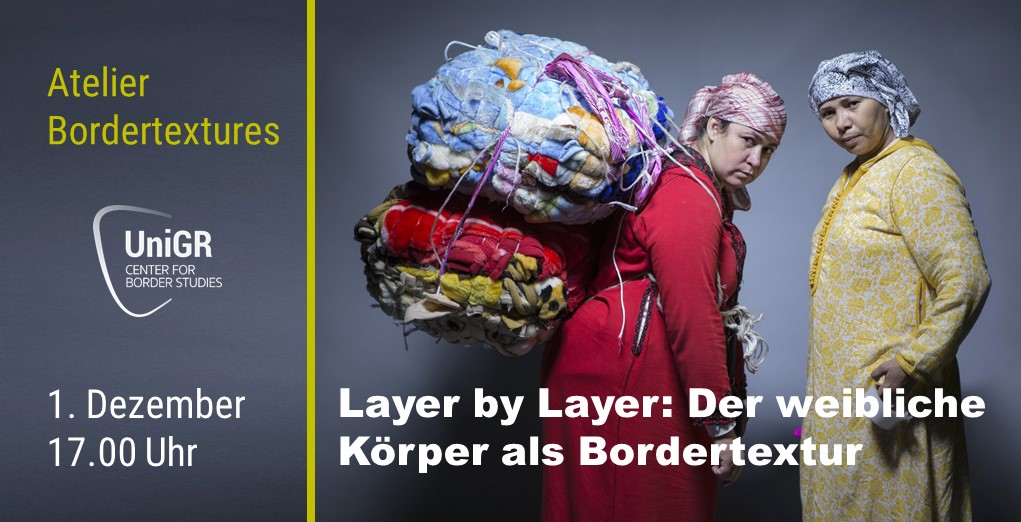
15 November 2021
Jurisdictional Incongruences and Flexible Imperial Borders: An American Studies Perspective
Jens Temmen (Heinrich-Heine-University Düsseldorf)
15 November 2021, 16:30-18:30 CET
online via zoomRegister here: https://bit.ly/3v41UUk
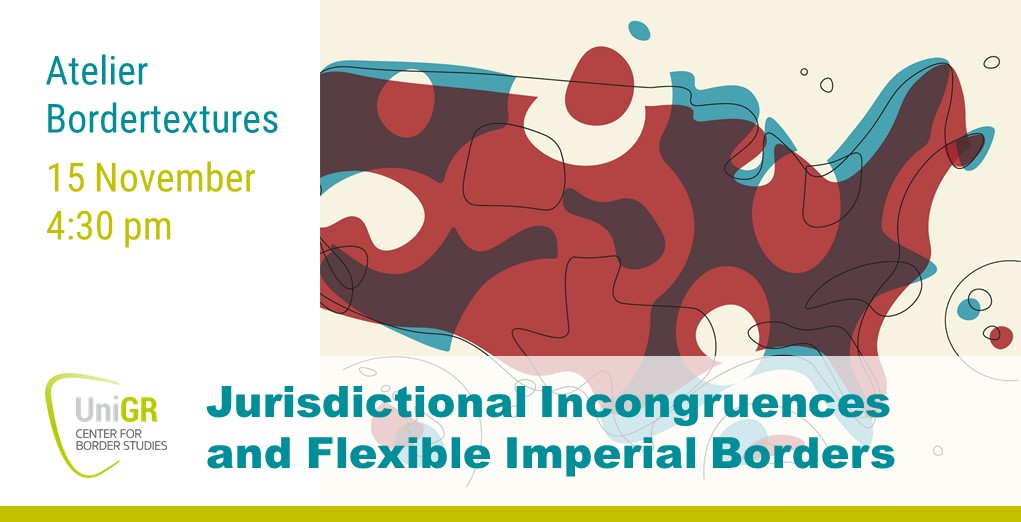
Recent scholarship in American Studies has centered the ways in which US imperialism today and in the past is characterized by the flexible reshaping of the allegedly rigid notions of territory, sovereignty, jurisdiction - a reshaping that frames the US as a semi-permeable and multilayered space that enables the expansion of its borders and colonial rule while simultaneously curbing postcolonial resistance within this space (cf. Temmen; cf. Goldstein). This notion of a strategic jurisdictional incongruence in the US context touches upon the very foundations of the model of the Westphalian nation-state. Based on this research, my contribution to the Atelier Bordertextures aims at exploring how flexible territoriality applies to other (post)colonial contexts such as Germany or the European Union and, for example, their discursive framing of migrant transit centers inside and outside European territory (cf. “Fiktion der Nichteinreise“).
Jens Temmen is an assistant professor for American Studies at Heinrich-Heine-University Düsseldorf (Germany). He received his PhD in American Studies as part of his PhD fellowship with the Research Training Group minor cosmopolitanisms at the University of Potsdam. His first monograph titled The Territorialities of US Imperialism(s) (Universitätsverlag Winter) was published in 2020. His postdoctoral research project employs an ecocritical and posthuman studies lens to analyze representations of Mars colonization in contemporary US literature and culture.
18 May 2021
Mehr-als-menschliche Bordertexturen: Tiere und Viren als Grenzsubjekte denken
[More-than-Human Bordertextures: Thinking Animals and Viruses as Border Subjects]
Larissa Fleischmann (Martin Luther University Halle-Wittenberg)
18 May 2021, 16:30-18:30
online via zoomRegister here: https://bit.ly/3d4Am9X
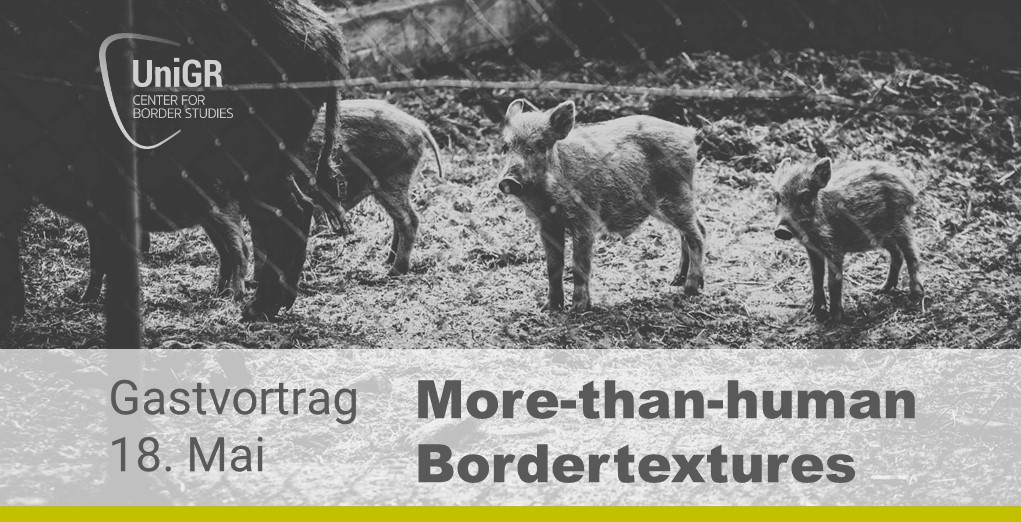
Animals and viruses set in motion powerful border (de)stabilizations. This is clearly demonstrated by the handling of African swine fever – a viral disease that is currently being considered as the most threatening animal disease. In order to prevent the spread of African swine fever through wild boars, numerous European states are taking measures that materialize in the expansion of national border barriers in the form of veterinary fences. Building on this, this lecture addresses the question of how animals and viruses can be thought of as border subjects. In doing so, I argue for a more-than-human approach to borders that takes into account the multiple relational connections between humans, animals, viruses, objects, and technologies. The bordertextures approach offers fruitful access points for this concern, as it allows us to examine territorial borders with reference to a variety of human and non-human elements.
Larissa Fleischmann works as a postdoctoral researcher in the Department of Human Geography at Martin Luther University Halle-Wittenberg. In her current DFG-funded research project, she is investigating more-than-human political geographies of animal health in Europe and Southern Africa. Her research interests include critical migration and border studies, animal studies, and more-than-human geographies.
- 2020
-
6 February 2020
Borders as Assemblages: Some Theoretical and Methodological Perspectives
Luca Greco (University of Lorraine)
6 February 2020, 16:00-18:00
Saarland University, bldg. A5 3, room 203
As a sociolinguist working with and on speech practices in a variety of contexts, Luca Greco is interested in how social and institutional actors talk about borders in ordinary conversations, in institutional talk and in digital contexts. Within the praxeological perspective they mobilize in their research borders are not just as a topic in discourse, they are constituted, contested, reformultated by discourse, i.e. a multisemiotic repertoire composed by talk, text, bodies, and different types of materialities. In a particular way, in this lecture, Luca Greco proposes to approach the analysis of borders through the notion of “assemblage” as it emerges in anthropology, in philosophy with the work of Deleuze and Guattari, and in sociology. Drawing from a corpus they collected at the Italian-French borders, composed by graphic inscriptions focused on borders, and inspired by the Italian debate about the reception of migrants and the closing of the ports (2018-2019), Luca Greco will show four intertwined dimensions at work in the analysis: the multiplicity of semiotic resources, the temporality, the indexicality, and the performativity of borders in and as speech practices.
After receiving his PhD in Linguistics from the Ecole des Hautes Etudes en Sciences Sociales (EHESS Paris) and being associate professor of Sociolinguistics at the University Paris III Sorbonne Nouvelle (2003-2018), Luca Greco was appointed as full professor in sociolinguistics at the University of Lorraine in 2018.
This lecture is part of the pluridisciplinary lecture series Entretiens franco-allemands of the Pôle France at Saarland University.

- 2019
-
5 December 2019
Re-thinking borders through a complexity lens: complex textures towards an alternative politics of hope
Chiara Brambilla (University of Bergamo, IULM University - Milan)
5 December 2019, 14:00-16:00
University of Luxembourg, Campus BelvalThis lecture aims to explore the potential of a complexity approach for the development of novel ways to understand the emergence and role of borders and their relation to contemporary global phenomena. Specifically, the lecture highlights how the concept of bordertextures can be regarded as a valuable tool to better understand the heuristic, conceptual, methodological, and practical potential of a complexity approach to move further in recent conceptualisations of borders. Against this background, this lecture sets out to do two things: On the one hand, to show how a complexity approach is particularly helpful for advancing research on the border-migration nexus by establishing a productive dialogue with the emerging conceptualization of bordertextures and borderscapes within the field of critical border studies. On the other hand, to reflect on how complexity can be operationalized in research on borders.
Chiara Brambilla has a PhD in Anthropology and Epistemology of Complexity and is a Research Fellow in Anthropology and Geography at the Academy for Teaching and Learning Quality (CQIA), University of Bergamo and Adjunct Professor of Cultural Anthropology, IULM University of Milan. Her research focuses on anthropology, critical geopolitics and epistemology of borders, the Mediterranean border-migration nexus, border aesthetics, borders in Africa and (post-)colonialism. She is regional editor for Europe of the Journal of Borderlands Studies.
This lecture is part of the international Workshop “Borders as Border Complexities” (5/6 December 2019).
26 June 2019
Border Aesthetics: Visibility and Invisibility at the US-Mexico Divide
Markus Heide (Uppsala University)
26 June 2019, 16:00-18:00
Saarland University, Campus SaarbrückenIn the 80s and 90s artists and writers who engaged in what today is referred to as “border art” had a strong focus on forms of cultural blending and mixing as well as liberating concepts of de-categorization. Some of these artists and writers highlighted the utopian potential of border space. Their literary and artistic work has contributed to theorizing various forms of mixing. Their border art inspired postcolonial concepts of hybridity, metissage and mestizaje. Following this period, in the late 90s and particularly after 9/11, surveillance became a concern in art that critically explored border paradigms. More recently, the focus of border art shifted towards questions of violence: narco violence, feminicide, immigration, but also structural violence that established criteria defining who is allowed to cross the border and who is not. The lecture will discuss intersections of politics and aesthetics in the contemporary US-Mexico borderlands.
Markus Heide is associate professor at the Swedish Institute for North-American Studies at Uppsala University. His recent research concentrates on Inter-American relations (USA, Canada, Mexico) and the US-Mexico border. In this context he co-edited Hemispheric Encounters: The Early United States in Transnational Perspective (2015) and published academic contributions on border film, border art, and “narcocorridos” in the US and Europe. In 2017 and 2018 he was visiting research fellow at the Center for Iberian and Latin American Studies at UC San Diego, doing research and field work on The US-Mexico Borderlands as Contested Space: Film, Art, and Popular Culture.
- 2018
-
6 December 2018
Globalized Borders: An Archaeology of Border Theory, Border Poetics and Border Aesthetics
Johan Schimanski (University of Oslo & University of Eastern Finland)
6 December 2018, 15.30-17
University of Luxembourg, Campus Belval
Maison du Savoir, salle 4.510Border Theory, Border Poetics and Border Aesthetics are theoretical formations which inhabit the interstices between Literary, Cultural and Border Studies in the wake of poststructuralism, postcolonialism and Chicana/o studies. In this lecture I will be tracing an archaeology of the theoretical concerns, concepts and interdisciplinary engagements which have developed in these approaches to borders. What may such an archaeology tell us about possible future developments in the study of borders and culture in a world in which borders have become globalized, such as the recent formation of the Border Textures concept?
Johan Schimanski is Professor of Comparative Literature at the University of Oslo, Research Head at the Department of Literature, Area Studies and European Languages there. He is also affiliated to the University of Eastern Finland as a Professor of Cultural Encounters. Recent publications include the collaboration Border Aesthetics: Concepts and Intersections (2017). A book of border theory translated into German will be published in 2019.
13 June 2018
Migrierende Grenzen und Zeitverschiebungen: Zum Zusammenhang von Temporalitäten und Grenzüberquerungen in Europa
Carolin Leutloff-Grandits
Europe University Viadrina Frankfurt (Oder)
13 June 2018, 4-6 p.m.
Building B 3.1, Room 011 (Sitzungssaal)
Saarland University, Campus Saarbrücken[Migrating Borders and Changing Times: Temporalities and Border Crossings in Europe (Talk in German)]
Dr. Leutloff-Grandits's talk will present interrelations between borders, border crossings and temporalities from theoretical perspectives before exploring connections between theoretical approaches and practical implications of migration and flight. The presentation is going to discuss temporalities in relation to borders and ordering processes as well as the situatedness of migrants in time.
Dr. Carolin Leutloff-Grandits holds a PhD in social anthropology. Her research is centered on questions of migration, family, social security and implications of borders with a special focus on the geographical areas of Croatia, Kosovo, Germany and Austria. After receiving her PhD in 2015 from the Max-Planck-Institute for ethnologies in Halle/Saale, she worked for different research projects at Graz University and taught at the University of Vienna. Since April 2018 she is scientific coordinator at the Viadrina Center B/ORDERS IN MOTION at the Europe University Viadrina in Frankfurt / Oder.
22 February 2018
Infrastrukturen der Grenze
Hannes Krämer (European University Viadrina Frankfurt/Oder)
February 22, 2018
3.30-5.00 p.m.
University of Luxembourg
Campus Belval | Maison du Savoir | salle 3.120[Infrastructures of the border (Talk in German)]
Borders do not exist out of nothing; they require material and symbolic creation processes. They thus rely on infrastructures, i.e. on the efficacious and often invisible principles of connection and separation, which, as some kind of “substrate,” offer the basis for social processes. The understanding of borders as infrastructural formations allows accessing the individual dimensions of the multiple bordering processes as well as a description of the relationality of border dimensions. This lecture reconstructs the potential of the concept of infrastructure for the analysis of border and boundary processes and illustrates the praxeological reformulation of such an understanding of a “border.”
Dr. Hannes Krämer is scientific coordinator of “Grenzforschung” (Border Studies) and director of the research group “Border & Boundary Studies” at the Viadrina Center B/ORDERS IN MOTION. He studied social sciences and communication and received his doctorate with a thesis on an ethnography of creative labor. His research fields are border studies, practice theory, labor and organizational research, mobility studies, and time research.
- 2017
-
7 June 2017
The Work of Global Border Writing
Claudia Sadowski-Smith (Arizona State University)
7 June 2017, 4-6 p.m.
Saarland University, Campus,
Building C 5 3, room 119This presentation places US-Mexico border theory in the larger context of global discourses about contemporary human border crossings. Claudia Sadowski-Smith will discuss how a growing body of writing about bordercrossings to the United States and the European Union complicates the prevailing focus in American Studies on the relationship of a particular population to a specific geographical border.

